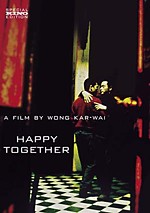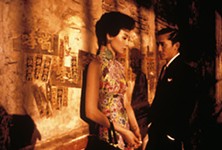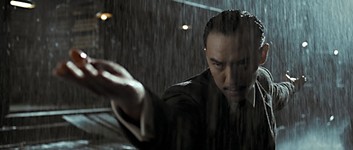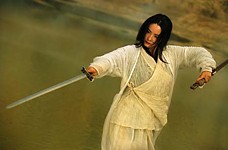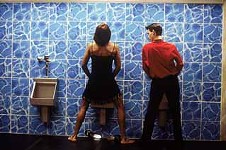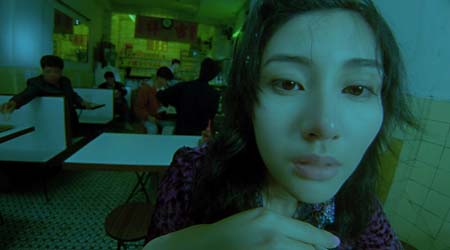
Fallen Angels
1995, NR, 97 min. Directed by Wong Kar-Wai. Starring Michelle Reis, Leon Lai, Takeshi Kaneshiro, Karen Mok, Charlie Yeung.
REVIEWED By Russell Smith, Fri., April 10, 1998
Utopian futurists and apocalyptic doomsayers agree that modern urban culture is radically changing the interior lives of the men and women who inhabit it. It's hard to say which camp, if either, Hong Kong director Wong Kar-Wai (Happy Together) belongs in, but one thing is for sure: No one is better than Wong at evoking the intoxicating, emotionally dissociative power of life in our sprawling First World metropolises. Like most of his films since 1988's As Tears Go By, Fallen Angels focuses on rootless young folks who are torn between their addiction to the city's exhilarating head rush of light, sound, and sexual stimulation and their vestigial desires for the emotional refuge of committed love. In this movie, which was shot three years ago as a companion piece to Chungking Express, an ensemble of twentyish urban pilgrims again do a spasmodic dance of nocturnal roaming, solitary pining, and gratification of their jaded pleasure receptors. It's familiar stuff for those who've seen any of Wong's recent work. So is the visual setting created by director of photography Christopher Doyle -- a fathomless opium reverie of pooling reds and umbers, streaming white motion trails, and haunting music that seems to ride on walls of cold night air. It's easy to lose yourself in this world. And that is Wong's point exactly. None of these characters -- a hit man (Lai) and his sexually frustrated “agent” (Reis, aka Michelle Lee); a mute, slightly addled ex-con (Kaneshiro); a pair of moody, lovelorn sexpots (Mok and Yeung) -- are really happy, but neither are they ready to make the sacrifices of freedom and emotional intensity that might be required to gratify their deeper longings. Because of his hard-to-track narratives and obsession with the sensual aspects of filmmaking, Wong is sometimes characterized along with directors like Michael Rymer (Angel Baby) and David Fincher (Seven) as a maker of feature-length music videos. But whereas videos are all about scattershot, fragmentary impressions, Wong explores his visions with the serene patience of a man searching for images in a shifting cloud bank. Rather than trying to impose meaning on seemingly disjointed images and events, he focuses his gaze so deeply that the meaning emerges unbidden. This unstructured approach poses obvious challenges to actors, but often (as is the case with Fallen Angels) it results in superior work by competent actors like Kaneshiro and outright brilliance by established stars such as Reis and Lai. To a large extent, you're either on the bus with Wong's defiantly unconventional approach or not. However, if you're fed up with the stultifying, formula-driven character of today's mainstream films, give Fallen Angels a try. At the very least you'll be engaged, and if you're lucky you may just recapture some of your original wonder at the seductive power of movies.
A note to readers: Bold and uncensored, The Austin Chronicle has been Austin’s independent news source for over 40 years, expressing the community’s political and environmental concerns and supporting its active cultural scene. Now more than ever, we need your support to continue supplying Austin with independent, free press. If real news is important to you, please consider making a donation of $5, $10 or whatever you can afford, to help keep our journalism on stands.
Jenny Nulf, Dec. 11, 2020
Kimberley Jones, Aug. 30, 2013
Marc Savlov, Nov. 7, 2008
Fallen Angels, Wong Kar-Wai, Michelle Reis, Leon Lai, Takeshi Kaneshiro, Karen Mok, Charlie Yeung





